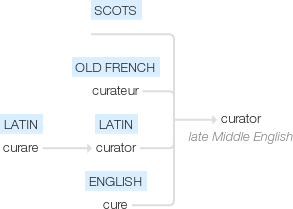Curator
late Middle English (denoting an ecclesiastical pastor, also (still a Scots legal term) the guardian of a minor): from Old French curateur or, in later use, directly from Latin curator, from curare (see cure). The current sense dates from the mid 17th century.
wiktionary
From Latin cūrātor(“one who has care of a thing, a manager, guardian, trustee”), from cūrāre(“to take care of”), from cūra(“care, heed, attention, anxiety, grief”).
etymonline
curator (n.)
"a guardian; one who has care or superintendence of something," late 14c., curatour "a parish priest," from Latin curator "overseer, manager, guardian," agent noun from curatus, past participle of curare (see cure (v.)). From early 15c. in reference to those put in charge of minors, lunatics, etc.; meaning "officer in charge of a museum, library, etc." is from 1660s. Related: Curatorship.
